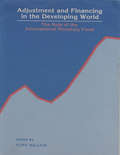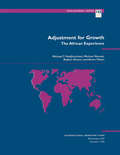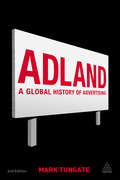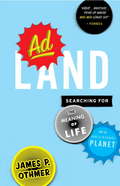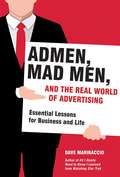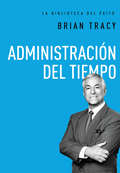- Table View
- List View
Adjusting the Levers: Levers of Organization Design at Work
by Robert L. SimonsThis chapter focuses on the important interplay of the four levers of organization design. Examples from three different organizations are used to discuss the effect of each design variable on the others.
Adjusting to Global Economic Change: The Dangerous Road Ahead
by David R. Frelinger James T. Bartis Robert A. LevineThe author combines macroeconomic history since the Great Depression with a brief exposition of economic theory that stems from and explains that history, and explores how that experience may apply to the present economic crisis. He warns that we may again be headed for stagflation and makes suggestions for escaping the worst effects of the crisis.
Adjusting to New Realities: MENA, The Uruguay Round, and the EU-Mediterranean Initiative
by Patricia Alonso-Gamo Khaled Sakr Susan FennellAdjusting to New Realities: MENA, The Uruguay Round, and the EU-Mediterranean Initiative
Adjusting to Reality: Beyond 'State Versus Market' in Economic Development (Routledge Revivals)
by Robert KlitgaardOriginally published in 1991, Robert Klitgaard’s classic book addresses questions of enduring relevance in a lively and insightful way. Bribes, tribes, and markets that fail—these are the realities in many developing countries. The usual strategies for reform—be they capitalist or socialist—have failed to address them effectively. What is to be done when economic reforms leave the poor behind or when when new constitutions and elections are undercut by inefficient bureaucracies, overcentralization, and corruption? And what to do about persistent ethnic inequalities within developing countries? The book provides inspiring examples from around the world, as well as analytical frameworks to guide inclusive policy discussion. Theorists will enjoy the novel uses of industrial economics, the theory of the firm, and the economics of discrimination. The book highlights overlooked causes of underdevelopment: imperfect information and weak information processing in individuals and institutions. In the preface, the former President of Panama, Dr. Nicolás Ardito Barletta, writes: "Poverty, Klitgaard argues, is—and should be—a principal concern of development strategists, but policy makers and analysts will continue to run from pillar to post in their search for a cure unless they can adjust their development schemes to reality…." "The new approach that the author proposes is based on two fundamental principles. One is that the proper choice of economic strategies cannot be determined in the abstract but depends on particular circumstances… The other is that information is at the heart of problems in the real world of the developing countries… Klitgaard offers examples from Bolivia, Brazil, India, Indonesia, Malaysia, Pakistan, Peru, and the Philippines to make his point. "The author suggests creative ways in which the state and citizens themselves can solve their own ‘inevitably unique problems.’ One of the key tasks, in Klitgaard’s view, is to ensure that environments are rich in information. This volume offers a broad framework for policy analysis that moves us closer to intelligent solutions to the real problems of the real poor in the modern world."
Adjustment Policies and Development Strategies in the Arab World
by International Monetary FundThe issues of adjustment and development in the Arab world have acquired urgency following the recent decline in oil prices and the unfavorable developments in the world economy. This seminar was thus timely and important. It provided and excellent opportunity for a number of participants concerned with adjustment and development to exchange views on a variety of important topics.
Adjustment Programs in Africa: The Recent Experience
by Justin B. Zulu Saleh M. Nsouli Nur Calika Lelde SchmitzFinancial report from the IMF
Adjustment and Financing in the Developing World
by Tony KillickThis book, edited by Tony Killick, consists of papers presented at a seminar sponsored jointly by the IMF and the Overseas Development Institute, held in London, England, to discuss the problems facing the developing world in a global environment of high inflation rates and large payments imbalances.
Adjustment and Growth in Sub-Saharan Africa
by Anupam Basu Dhaneshwar Ghura Evangelos A. CalamitsisAfter a prolonged crisis, sub-Saharan African countries have been broadening their reform efforts and enjoying improved economic growth rates. The gains they have made are fragile, however, and to achieve sustained progress they need to strengthen their current reform programs and resolve the serious conflicts threatening the region.
Adjustment and Poverty: Options and Choices (Priorities for Development Economics)
by Frances StewartThe last decade has brought sharp adjustment and rising poverty for most of the developing world. Adjustment and Poverty: Options and Choices examines the major causes and results of this situation, including: *the relationship between structural adjustment and poverty; *the extent to which the situation was brought about by internal and/or external policies; *the impact of the IMF and World Bank on adjusting countries; *government tax and spending policies - with a particular focus on social sector spending; *the possiblity of better policies in the future.
Adjustment for Growth: The African Experience
by International Monetary FundOccasional Paper from the IMF
Adjustment for Growth: The African Experience
by International Monetary FundFinancial report from the IMF
Adjustment under a Currency Peg: Estonia, Latvia and Lithuania during the Global Finanacial Crisis 2008-09
by Catriona Purfield Christoph RosenbergThe paper traces the Baltics' adjustment strategy during the 2008-09 global financial crisis. The abrupt end to the externally-financed domestic demand boom triggered a severe output collapse, bringing per capita income levels back to 2005/06 levels. In response to this shock, the Baltics undertook an internal devaluation that relied on unprecedented fiscal and nominal wage adjustment, steps to preserve financial sector stability as well as complementary efforts to facilitate voluntary private debt restructuring. One-and-half years on, the strategy is making good progress but not yet complete. Confidence in the exchange rate was maintained, the banking system was supported by its parent banks, external imbalances and inflation have largely disappeared, competitiveness is improving, and fiscal deficits are gradually being brought back towards pre-crisis levels. However, amid record levels of unemployment, further reforms are needed to foster a return to more balanced growth, fiscal sustainability, and a healthier banking system
Adjustment, Conditionality, and International Financing
by International Monetary FundThe seminar was the first to be conducted in Spanish under the seminar program for nonofficials recently established by the External Relations Department of the Fund. The seminar program aims at promoting understanding of what the Fund has done and is doing to help members with their balance of payments problems. The seminars are also designed to improve the Fund's knowledge of thinginh in academic, and other circles concerning the isues with which the Fund deals in order to find ways of enhancing the effectiveness of the Fund's work.
Adjustments and Tradeoffs: More Fine Tuning
by Harvard Business Review PressIt's not uncommon to recognize discrepancies between the objectives stated in the project charter and what the project is actually delivering. When addressing these gaps, decision makers must decide which trade-offs to focus on. This chapter focuses on how to facilitate the conversation, making room for better judgments about what is required to get the job done.
Adland
by Mark TungateAdland is a ground-breaking examination of modern advertising, from its early origins, to the evolution of the current advertising landscape. Bestselling author and journalist Mark Tungate examines key developments in advertising, from copy adverts, radio and television, to the opportunities afforded by the explosion of digital media. Adland focuses on key players in the industry and features exclusive interviews with leading names in advertising today, including Jean-Marie Dru, Sir Alan Parker, John Hegarty and Sir Martin Sorrell, as well as industry luminaries from the 20th Century such as Phil Dusenberry and George Lois. Exploring the roots of the advertising industry in New York and London, and going on to cover the emerging markets of Eastern Europe, Asia and Latin America, Adland offers a comprehensive examination of a global industry and suggests ways in which it is likely to develop in the future.
Adland: Searching for the Meaning of Life on a Branded Planet
by James P. OthmerSomewhere between The Tipping Point and Mad Men lies Adland. Adland is the wickedly funny, compelling personal chronicle of the rise and fall of a modern-day ad man; a riveting insider's look at the astonishing transformation taking place in advertising's hottest idea factories; and an introduction to the people whose job is to know what makes us tick, what makes us lean in, what we think we need and don't know that we want. Amidst the tales of lavish shoots, agencies on the brink, and pampered mega-brands Adland is also a snapshot of how we live our lives on this earth at this particular moment . . . thirty seconds at a time.
Admen, Mad Men, and the Real World of Advertising: Essential Lessons for Business and Life
by Dave MarinaccioA bestselling author and advertising veteran shares a life’s lessons from the ad trade.Dave Marinaccio, cofounder and the creative director of LMO Advertising, is a veteran of the industry who, as a young man starting out, studied stand-up at Second City in Chicago. He later wrote an international bestseller, All I Really Need to Know I Learned from Watching Star Trek. His equally entertaining new book takes us inside the world of advertising, offering stories and observations from his three decades at some of America's best-known agencies, working with clients from Pizza Hut to the Holocaust Museum. In short, punchy chapters, Dave pulls back the curtain and shares his insights on how marketing decisions are made and other lessons. His topics range from logos, the big idea, and selling perfume to how we undervalue our gifts, to do-overs, celebrities, and "meetingsmanship." And more than a few lessons turn out to be apt not just for business but for our stressed-out lives.Admen, Mad Men, and the Real World of Advertising is written to be easily digestible by interns, CEOS, or anyone who has ever watched a television commercial or clicked on a banner ad. Irreverent, packed with useful information, and unflinchingly honest, it is a serious business book by a seriously funny man and a must for anyone who lives, works, or plays in today's commercial culture.
Administered Protection in America (Routledge Revivals)
by Alan Rugman Andrew D. AndersonFirst published in 1987, Administered Protection in America follows calls in the United States, at that time, for the protection of American industries and the preservation of jobs threatened by foreign competition. Professor Rugman’s and Dr Anderson’s work presents evidence that the United States already has a system of administered protection in place in the form of escape clauses, countervailing duty and anti-dumping procedures. The book argues that the application of these procedures by a largely decentralised administration has reduced United States state policy to a state of near anarchy. Rugman and Anderson argue that this is counterproductive for the United States and extremely harmful for America’s trading partners in Europe, Canada and the Far East. The conclusion looks at discussions of trade negotiations with Canada, in which Canada was pursuing a bilateral free trade agreement with the United States.
Administering Fiscal Regimes for Extractive Industries: A Handbook
by Jack CalderA report from the International Monetary Fund.
Administración Del Tiempo ( Time Management): Obtén más por tus esfuerzos ahora mismo
by Jim EvansNo hay suficiente tiempo para realizar todo en nuestra lista de cosas por hacer, y simplemente nunca lo habrá. La gente exitosa no intenta realizar todo. Ellos aprenden a enfocarse en las tareas más importantes asegurándose de terminarlas. Ellos simplemente las hacen sin dilaciones. Independientemente de la disciplina, el trabajo siempre conlleva un cierto número de tareas diarias, preocupaciones y distracciones. Con tantas cosas para cumplir dentro de un tiempo determinado, la productividad es todo un tema para empleados y jefes. ¿Qué estás esperando? ¡No esperes más! ¡Desplázate hacia arriba y haz click en el botón de comprar para comenzar el viaje hacia la vida de tus sueños!
Administración Del Tiempo : Cómo Gestionar El Tiempo Para Lograr Un Mayor Éxito .
by David Roos¿No me crees? Bueno, La cuestión es que la administración del tiempo es como la guerra. Las estrategias correctas aseguran una victoria sin esfuerzo. ¿Y adivina qué? Dentro de este libro, usted también aprenderá a alcanzar sus metas con facilidad. Usted descubrirá poderosas estrategias y técnicas explosivas (generalmente no literalmente, ¡pero ten cuidado!) que te permitirán sacar más provecho de tu día. Instruido por más de una década de experiencia práctica en los niveles más altos de la empresa, este libro muestra cómo hacer retroceder la marea y crear espacio en su vida para pensar, relacionarse y actuar en un nivel más profundo. Aprender a concentrarse, administrar el tiempo y tomar el control de su espacio mental y físico es el primer paso para desarrollarse y sobresalir en cualquier cosa. No espere más para descubrir SU LLAVE para una vida nueva y mejor.
Administración Del Tiempo: Algunos Mitos Importantes Que Frenan A Las Personas
by Francesco HornbakerEste libro es una colección de principios de productividad que le ayudarán a lograr más en su jornada diaria de trabajo minuto a minuto, y en la obra de su vida al ayudarle a dirigirlo en una senda más apropiada para usted como undividuo. Este libro le ayudará a identificar lo que es más importante para usted, enfocándose en esas cuestiones, y a decir no a los asuntos que no son importantes. "El tiempo es oro", como dice el dicho, pero la mayoría de nosotros nunca sentimos que tenemos suficiente de ellos. En "Controla tu tiempo, controla tu vida", el experto en productividad aclamado internacionalmente y autor de best-sellers Brian Tracy presenta una nueva y brillante aproximación a la administración del tiempo que le ayudará a ganar control de su tiempo y lograr hacer mucho más, más rápido y más fácilmente de lo que usted creyó posible. Si está listo para tomar acción y cambiar su vida para mejor, este libro definitivamente le guiará en la dirección correcta.
Administración Del Tiempo: Como Ser El Amo De Su Tiempo
by Pat JohnsonPareciera que nunca hay suficiente tiempo durante el día. Pero, ya que todos tenemos las mismas 24 horas, ¿por qué algunas personas logran mucho más con su tiempo que otras? La respuesta está en la administración del tiempo. Estos sencillos consejos han sido escritos para proporcionar un resumen reflexivo, informativo y fácil de digerir sobre cómo lograr una mejor administración de su tiempo. Es que simplemente, estamos todos demasiados ocupados en estos días. Ya sea que estemos ocupados formando una carrera, administrando el hogar o estudiando para los exámenes, todos podemos fácilmente llegar a estar sobrecargados con la enorme cantidad de "cosas" que se deben hacer en el día a día. Descargue Este Gran Libro Hoy!
Administración Del Tiempo: El Poder Del Tiempo Y Cómo Manejarlo
by Jean KennedySi eres parte de la generación de la productividad, es probable que hayas escuchado innumerables ordenes de producir más, sin que te hayan entregado si quiera las herramientas para hacerlo. Horas extras e incentivos prometidos no son suficientes para colocarte en el camino de la productividad si no has aprendido las lecciones adecuadas. ¿Estás listo para trabajar en una lista de cosas por hacer y mejorar tu productividad y eficiencia, en dirección de una excelente satisfacción personal y calidad de vida? Asumiendo que sí, ¡compra el libro para que podamos continuar!
Administración del tiempo
by Brian TracyAdministración del tiempo Más que cualquier otra habilidad en tu carrera, la capacidad de manejar el tiempo determinará tu éxito o fracaso. Es una simple ecuación. En cuanto mejor uses tu tiempo, conseguirás más y más grandes serán tus recompensas. Esta práctica guía de bolsillo revela 21 técnicas comprobadas que puede usar inmediatamente para ganar dos o más horas productivas cada día. Ofrece las estrategias que el experto en negocios Brian Tracy ha identificado como las más eficaces que él mismo emplea. Lleno de la sabiduría característica de Brian Tracy, este libro te ayudará a conseguir más cosas... y con mucho menos estrés. Este práctico libro te enseñará a: * Manejar las interminables interrupciones, reuniones, correos electrónicos y llamadas telefónicas * Identificar sus principales áreas de resultados * Designar suficiente tiempo para las responsabilidades más prioritarias * Agrupar las actividades similares para mantenerse enfocado y aprovechar al máximo cada minuto * Superar la postergación * Determinar que delegar y que eliminar * Utilizar el Programa de evaluación y técnicas de revisión para trabajar a partir del futuro... y asegurar que alcanza sus metas más importantes * Y más.




